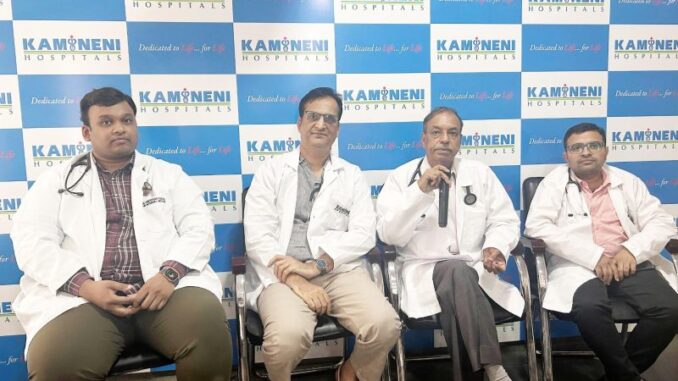
• In dengue, diarrhea appears first, followed by fever
• Rising number of influenza cases
• People with lung problems must be extra cautious
• Avoid outside food… masks are mandatory
• Wash hands before eating
• Kamineni Hospital doctors’ advice
Even before winter sets in, seasonal fevers are increasing across Hyderabad. After the rains, the subsequent dry weather is giving rise to various viruses, leading to multiple fever outbreaks. Dengue, influenza, and chikungunya are currently the most common. People must protect themselves and watch out for symptoms, advised Dr. M. Swami, Head of General Medicine and Senior Consultant Physician at Kamineni Hospitals, one of the city’s leading hospitals. He, along with Senior Consultant Physician Dr. Harikishan, and Consultant General Physicians Dr. Srikrishna Raghavendra Boddu and Dr. Pradeep Kumar Patel, spoke at a press conference on Tuesday to alert the public about the fever season.
Dr. M. Swami said “With the changing weather, many types of fevers are on the rise — especially influenza, dengue, and chikungunya. This season, the symptoms are somewhat different compared to earlier. In dengue, instead of the usual body pains and platelet drop, patients are first experiencing diarrhea, followed by fever after a day or two, and then a platelet drop. Influenza cases are also increasing — at least five new cases per week are being reported at Kamineni Hospital alone. Chikungunya too is spreading rapidly.
Stagnant rainwater and weather changes are the main reasons behind the spread of these fevers. Additionally, the sharp rise in air pollution is worsening conditions for people with allergies or chronic lung diseases like COPD. Even a short trip outdoors in city traffic is leaving them with severe cough, breathlessness, and worsening lung problems, along with fever.”
Dr. Harikishan said “Citizens must protect themselves from these illnesses. Getting vaccinated with flu shots or quadrivalent vaccines (which protect against four strains) before falling sick is strongly recommended. Normally, their effect lasts 6–8 months, but with proper precautions, protection can extend up to a year. Avoid crowded places as much as possible. Installing air filters at homes and offices is advisable. Drink 6–8 glasses of boiled and cooled water daily — water must be boiled until bubbles appear, cooled for an hour, and stored only in glass or steel bottles, never plastic ones. Avoid eating outside food. Always eat freshly cooked, hot meals at home to prevent gastroenteritis. If stepping outside, wearing a mask is a must. Wash hands thoroughly before eating.”
Dr. Srikrishna Raghavendra and Dr. Pradeep Kumar Patel added “Many people self-medicate with tablets like Dolo for the first 2–3 days of fever and only visit the hospital if symptoms don’t subside. By then, valuable time for proper tests is already lost. This season, it is important to consult a doctor immediately if fever starts. Based on symptoms, doctors can conduct necessary blood tests and prescribe the right medicines. Since dengue, chikungunya, and influenza require different treatments, timely medical attention is crucial. With these precautions, the health of city residents can be safeguarded.”
